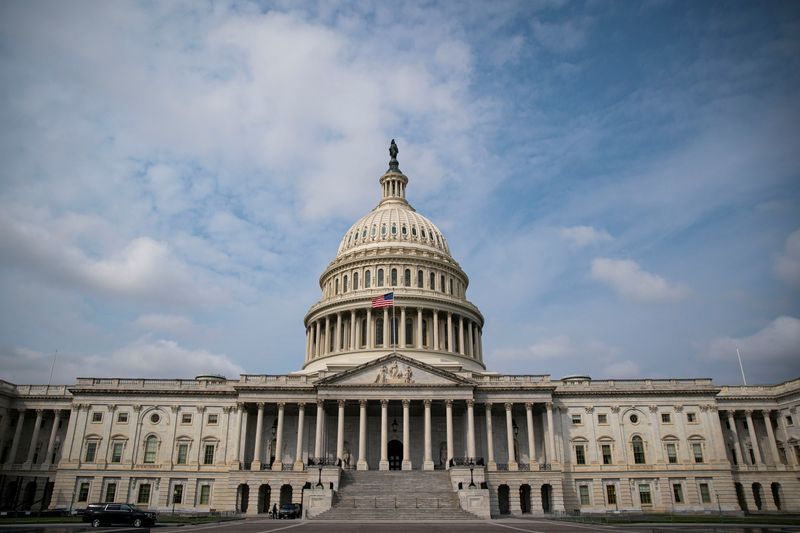(Bloomberg) -- President Joe Biden’s $1.9 trillion package will sail through the House when it takes up the bill on Tuesday, according to Democratic lawmakers and aides, even after proposals progressives championed were scaled back.
The Senate’s changes to the House-passed bill, made to appease moderates and comply with parliamentary rules, are unlikely to prove enough to make progressive Democrats vote against it.
House Speaker Nancy Pelosi can only afford to have four Democrats oppose a bill for it to pass, if all members are voting and Republicans are lined up in opposition, given her party’s thin majority. Two Democrats joined a united GOP in voting against the initial version of the stimulus.
Pelosi on Sunday predicted the bill will pass.
“In two days, the House will have a resounding, hopefully bipartisan, vote for justice,” Pelosi said in a letter to her caucus on Sunday. “We can then send it to the president and move quickly to distribute its life-saving resources.”
Other senior lawmakers agreed.
“I don’t think there is any trouble. What Democrat is going to vote against a bill that cuts poverty by a third, expands child tax credits and SNAP, gives $1,400 to 80% of their constituents?” said Budget Chairman John Yarmuth, a chief architect of the American Rescue Plan bill. SNAP refers to a federal food-assistance program.
With Biden now cruising to his first legislative victory less than two months after proposing his relief bill, economists have baked its effects into their forecasts for a stronger recovery in 2021.
Goldman Sachs Group Inc (NYSE:GS). economists see the unemployment rate tumbling to 4.3% by year-end, from 6.2% in February, with employment climbing by almost 7.4 million for 2021, making up most of the 9.4 million plunge in payrolls last year.
“Growth will be rip-roaring during the coming year,” Moodys (NYSE:MCO) Analytics chief economist Mark Zandi wrote Sunday, due to additional fiscal stimulus, the end of the pandemic and consumers emerging from lockdown.
The outsize stimulus has propelled a surge in bond yields, with 10-year rates punching through to the highest levels in more than a year last week.
Deadline Nears
Democratic aides said the looming March 14 expiration of enhanced unemployment benefits makes for a strong disincentive for any rank-and-file members to try to force a renegotiation with the Senate. That could risk missing the deadline, with assistance lapsing.
Progressives who had expressed concern about any changes in the Senate so far are holding their fire, with the Congressional Progressive (NYSE:PGR) Caucus issuing a statement calling the upper chamber’s changes “minor.”
Outside groups, like the Justice Democrats and Sunrise movement, were also quiet on the bill over the weekend.
The Senate reduced weekly supplemental unemployment benefit to $300 per week through Sept. 6, compared with $400 through August in the House bill. The new version also now lets individuals earning up to $150,000 to collect $10,200 in benefits tax free.
Senate’s Tweaks
While the ceiling for zeroing out stimulus checks was lowered to $80,000 from $100,000 by the Senate, the bill now made student-loan relief tax-free. A progressive attempt to add a phased-in $15 minimum wage to the package failed when eight senators in the Democratic caucus voted Friday against waiving budget rules to allow it in the bill.
Marathon negotiations Friday night showcased the delicate balance of power in the Senate, and the sway of moderates. Senate Majority Leader Chuck Schumer contended with a move by West Virginia Democrat Joe Manchin to back a GOP proposal to phase out the enhanced jobless benefits by mid-July.
With Schumer arguing that such a change could cause trouble in the House, Manchin ultimately compromised, and backed the deal to keep aid going until September.
Progressive House Democrats are already turning their attention to getting their proposals in a second budget reconciliation bill -- which allows for Senate approval by a simple majority, rather than the usual 60 votes to cut off debate. Congress is expected to take up the next reconciliation bill before the August recess.
Read More: Biden’s Economic Legacy at Stake as Next Package Takes Shape
The White House is already engaged in crafting a “Build Back Better” package that is expected include both infrastructure investments and progressive priorities like funding for child and elder care.
“There’s still work to be done, but this is a crucial down-payment on the $3-to-$4.5 trillion in stimulus needed to fully recover,” Congressional Progressive Caucus Chair Pramila Jayapal tweeted after the Senate passed the bill.
©2021 Bloomberg L.P.
